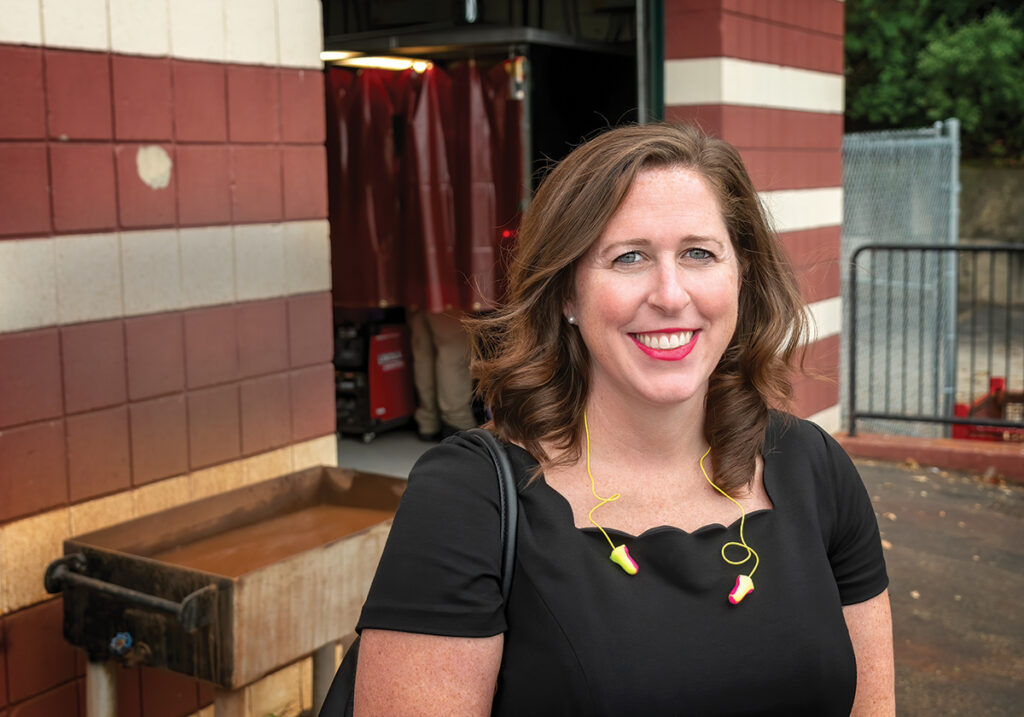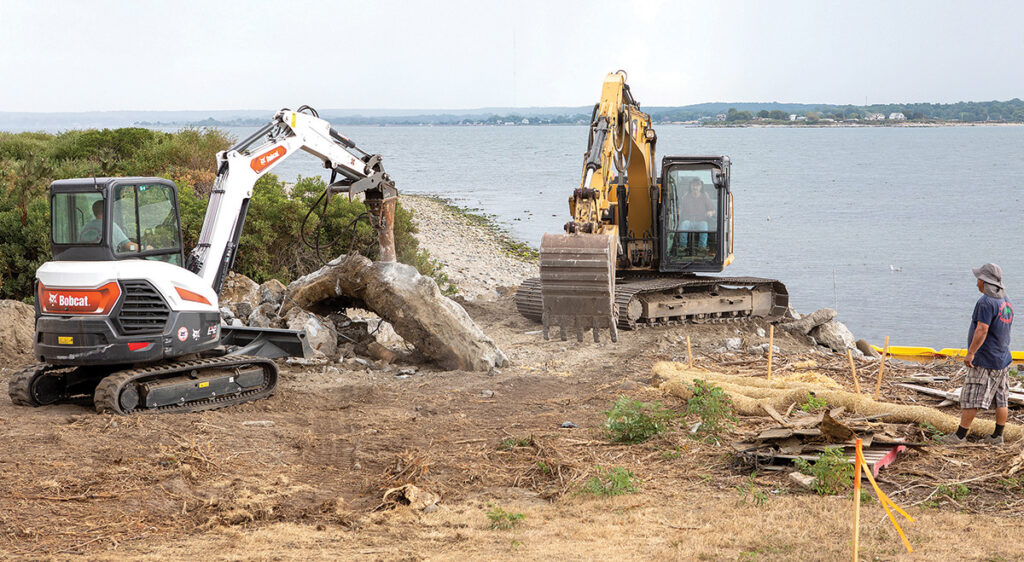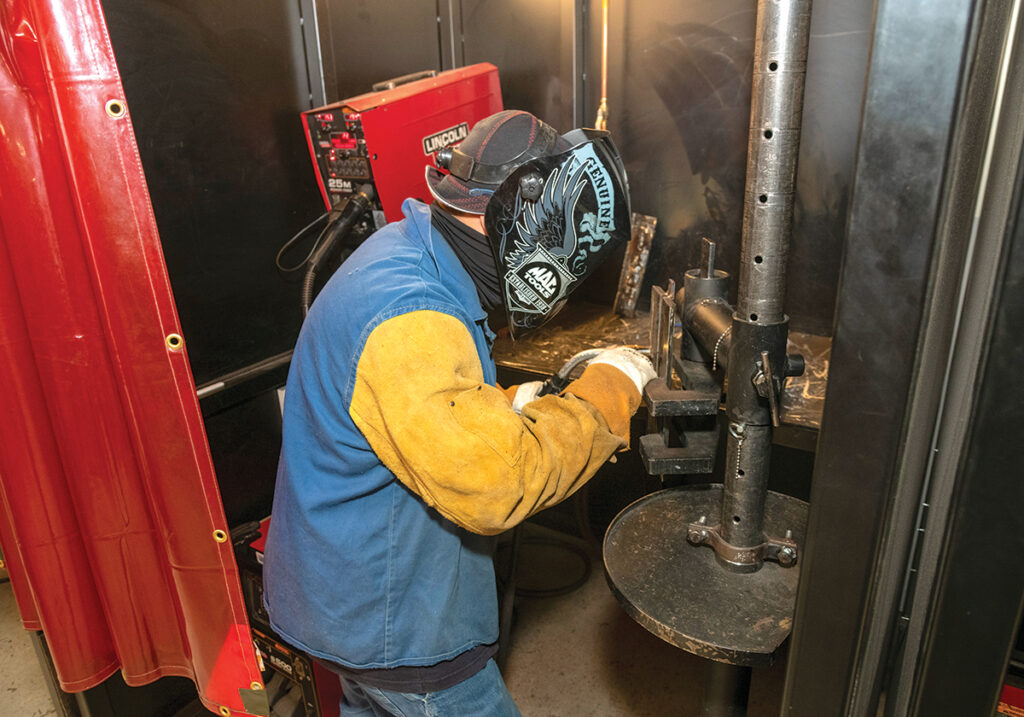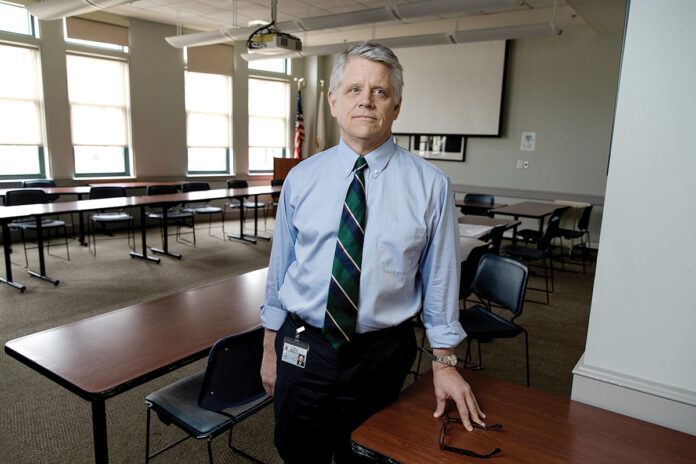Scott R. Jensen watched helplessly as the number of out-of-work Rhode Islanders soared when COVID-19 hit in March.
For months, unemployment claims climbed higher. And with much of the state shut down to prevent the spread of the virus, there wasn’t much the director of the R.I. Department of Labor and Training could do to turn it around.
But he had ample time to think and ultimately help craft what state leaders are touting as a “first-of-its-kind” workforce-development program aimed at blazing new career paths for some of the thousands of Rhode Islanders who have lost jobs due to the pandemic.
What truly sets Back to Work RI apart from countless other job-training initiatives is the dozen major companies that committed to hiring the people who participate. They include high-profile names such as Twitter and Salesforce, as well as key state and regional employers such as Bank of America Corp., Care New England Health System and General Dynamics Electric Boat.
“The big, marquee-name companies are really, really important partners because they can hire a lot of people, but also because they inspire confidence that Rhode Island is very serious about this,” Jensen said.
But whether the newly unveiled initiative can live up to its lofty goals remains to be seen. Details of how the program will work are still being ironed out, and the 3,000 jobs promised by the dozen committed companies are guaranteed only through their verbal commitments, which could change amid the uncertain economy.
“In itself, training does not create jobs; employers create jobs,” said Livia Lam, a senior fellow and director of workforce development for the Center for American Progress. However, she added, “as a policy to help support recovery, it can be very important.”
Back to Work RI builds upon the already successful Real Jobs RI program, which has employed 3,500 residents and increased the skills of another 5,800 already-employed workers since it started in 2016, according to DLT.
The program replaced the antiquated “train and pray” approach with training programs tailored to meet the immediate and long-term hiring needs of employers.
[caption id="attachment_343111" align="aligncenter" width="1024"]

HIRING: Courtney Murphy, director of workforce development for General Dynamics Electric Boat, says the company has hired 150 workers since March and plans to hire an additional 350 welders and shipbuilders by the end of the year. / PBN PHOTO/MICHAEL SALERNO[/caption]
Using $45 million in federal stimulus funds, the state is now aiming to create a total of 7,000 high-paying, career-quality jobs, offering paid training and supportive services – individual career coaches, child care, transportation – that will help put trainees to work. The additional 4,000 jobs the state is projecting would come from getting more large companies to sign up, and smaller businesses to participate by filling openings from newly trained people, Jensen said.
What the training entails – how long it lasts, who oversees and pays for it, where it takes place – varies by industry and employer.
Some are hosted by DLT, others through the Community College of Rhode Island and still others through the companies themselves. Salesforce, for example, said in a press release that it would train future employees using its online-learning platform known as Trailhead. A spokesperson for Salesforce declined to provide any additional details on the number or types of jobs the company would hire, referring all comments back to its press release.
Many of the partnering employers have long faced shortages of qualified workers and would welcome newly trained candidates. Over half of the workers in the state’s financial-services sector, for example, are over 55, and younger replacements are often being drawn to larger markets in Boston and New York.
“We need new blood and we also need greater diversity within [banking],” said William Hatfield, market president for Bank of America in Rhode Island. As one of the private partners in the program, Bank of America has committed to hiring 250 workers to add to its 2,400-person workforce in Rhode Island, with jobs in sales, customer relations, and financial and investment services.
[caption id="attachment_343114" align="aligncenter" width="1024"]

AT THE CONTROLS: Aquidneck Landworks Inc. workers Bryan Clooney, in white excavator, and Joel Camara, in yellow excavator, demolish and excavate a patio near the shore of the Sakonnet River in Portsmouth. The Back to Work RI program may be an opportunity for the landscape company to find qualified workers, as owner Rick Miranda says he’s been hard-pressed to do so amid the industry’s growth in recent years. / PBN PHOTO/KATE WHITNEY LUCEY[/caption]
SHORT ON DETAILS
While Jensen touts the flexibility of the program as a key selling point for participating employers, the lack of detail makes it difficult to pin down specifics of the still-developing program.
All but two of the major employers involved – Bank of America and Lifespan Corp. – have not stated the number of jobs they will create.
Exactly what high-paying wages workers will earn also varies. There is no minimum amount, and companies interviewed by Providence Business News named starting hourly wages ranging from $14 to upward of $20. The program is aimed at helping those laid off because of COVID-19, but people looking to change careers or make more money in their fields aren’t necessarily going to be turned away, Jensen said.
Diversity and inclusion are also highlighted as central tenets of the program: specifically helping women, people of color and other groups that have borne the brunt of the economic downturn. But the companies interviewed were reluctant to commit to quotas, weighted applications or other tangible metrics that would ensure they hire from these groups.
And perhaps most concerning to Lam, the commitments from these companies are strictly verbal – there is no contract or other binding document holding them to their promised job creations. Some of these employers, such as Care New England, have already faced revenue shortages and layoffs in recent years. Care New England did not return multiple requests for comment on the financial implications of its commitment to new hires.
“At the end of the day, having an actual contract is fundamental to this working,” Lam said. “That’s how we define employment relationships.”
Responded Jensen: “You can’t possibly write a contract that says [employers] will do this. Really, the contract is on us to provide them with good employees.”
Edinaldo Tebaldi, an economics professor at Bryant University, says the program cannot single-handedly close the “massive skills gap” facing the state’s labor force. The state is aiming to create 7,000 jobs through the program, compared with the 104,000 people who received unemployment benefits during the week ending Aug. 28.
But it may make a dent, particularly for companies in industries that have struggled to keep up with growing demand despite, or because of, the pandemic.
[caption id="attachment_343110" align="aligncenter" width="1024"]

UP TO SPEED: Eric Tirado, of Warwick, is completing welder training at the New England Institute of Technology before starting work at General Dynamics Electric Boat on the new Columbia-class submarines for the U.S. Navy. / PBN PHOTO/
MICHAEL SALERNO[/caption]
HELP NEEDED
Take General Dynamics Electric Boat, which through its contract with the U.S. Navy continues work designing and building new classes of submarines out of Quonset Point in North Kingstown. The company has hired some 150 workers since March, with plans to hire another 350 welders and shipbuilders by the end of the year, according to Courtney Murphy, director of workforce development for Electric Boat.
Kayla DeJesus was one among the 10 trainees in EB’s newest class, which started Aug. 17. DeJesus has been unemployed since January after cycling through a series of jobs in recent years, some of which she left voluntarily and others that ended not by choice.
While collecting unemployment, DeJesus continued to scour the internet for open positions from the crowded Warwick home she shares with five family members. Then, COVID-19 hit and her job hunt became even more difficult.
Financial pressures grew. She was sometimes forced to choose between buying groceries or food for her horse, which she boards in a North Smithfield barn.
On her first day of the new training program, DeJesus felt a renewed sense of optimism, with the promise of a high-paying job and money already in her pocket thanks to EB paying her while she trains.
The health care industry, too, has faced its share of employment obstacles. The shortage of nurses and medical assistants at Care New England, which operates several hospitals across the state, has grown more dire since the pandemic arrived – a function of losing employees to health issues, child care needs and other reasons, according to Tanisha Watkins, workforce-development specialist for Care New England.
Nursing homes, already severely understaffed, took an even bigger hit, with workers resigning amid safety concerns and outbreaks of COVID-19. While that poses problems for companies that operate congregate-care facilities, it also creates opportunity for home health care workers.
“During this pandemic, what we have seen is that using nursing homes as the traditional first and last stop for seniors and people with disabilities has not worked out well for that population, or the people who work there,” said Adanjesus Marin, lead organizer for Service Employees International Union District 1199 New England, which is also partnering with the state on Back to Work RI.
The Providence-based union local representing health care workers has for several years sought to capitalize on this shift in senior care through a patient-care-assistant training program with Real Jobs RI. But transportation, child care and other barriers to attending the in-person training sessions proved problematic. Only two people have gone through the program, Marin said.
Now, using DLT funding through Back to Work RI, the union has plans to move its training sessions online, simultaneously offering a wage stipend to participants. Over 270 people have expressed interest in the new training program, Marin said.
Dawn Auclair is among them.
Auclair has a job as a certified nursing assistant at Hopkins Manor, a North Providence nursing home. But she has struggled with job demands, which have grown during the coronavirus crisis, and caring for her aging mother, who suffers from lung disease. The training program, and an eventual job that would be funded through the state’s Medicaid program, would allow her to be paid to care for her mother – a job she is doing anyway – and would free a bit of time to spend with her teenage daughter.
SMALLER PARTNERS
Small businesses are also poised to find workers through the new initiative, via the trade associations that DLT has partnered with to identify hiring companies and workforce needs.
Aquidneck Landworks Inc. could be one of them. As one of the 600 small businesses represented by the Rhode Island Nursery Landscape Association Inc., the Middletown-based landscaping company has a chance to fill its open positions with workers trained through Back to Work RI.
Rick Miranda, Aquidneck Landworks owner, didn’t want to commit to hiring until he knew more about the state program, but he lamented that he remains hard-pressed to find qualified workers amid the industry’s growth in recent years.
“People think of landscaping as someone who goes around and cuts lawns,” Miranda said. “They’re not aware you can have a career in our industry.”
Manufacturing, health care, landscaping and other in-demand industries largely require in-person work, which job seekers may be reluctant to do with the pandemic not fading.
Indeed, even more than child care or transportation, psychological barriers have been the greatest obstacle to people finding work since the onset of the pandemic, according to Nina Pande, executive director for Skills for Rhode Island’s Future, a private nonprofit that serves as an intermediary between job seekers and employers.
But as Pande pointed out, there are remote work opportunities too, and the work-from-home shift ushered in by the pandemic has allowed the state to go after national employers that do not have a physical presence in Rhode Island.
[caption id="attachment_343113" align="aligncenter" width="1024"]

PARKED: David Paolino, a school bus driver, was laid off and has been collecting unemployment since March, when schools transitioned to distance learning due to the COVID-19 pandemic. / PBN PHOTO/MICHAEL SALERNO[/caption]
NOTHING DOING
David Paolino seems to be the type of person Back to Work RI is targeting, unemployed and in an industry that may take a long time to come back.
But Paolino, 37, has no interest in it.
Despite being laid off from his job as a bus driver for First Student Inc., which contracts with Rhode Island public schools, Paolino was reluctant to train for a new career, which he said negated the 16 years he has logged earning certifications and driving experience.
“To be asked to change career paths feels like a slap in the face,” Paolino said.
Paolino, who’s still hoping to get his old job back, was also skeptical that the jobs available through the program could match the $21 hourly wage and full medical benefits he received as a bus driver. As a single parent to his 7-year-old child and caretaker to his aging father, Paolino was the sole provider of financial support and health benefits for his family.
Whether trainees will get medical coverage depends on the program and future employer, according to Margaux Fontaine, a DLT spokeswoman.
Jensen acknowledged the constraints of the program. But he thinks it will have an important, catalytic effect for the state economy: increasing consumer spending and projecting confidence that attracts more businesses to the state.
Bruce Katz, an economic consultant who has written several economic reports for the state, noted that Rhode Island is ahead of the curve in adopting what will likely become the go-to training model – one led by employers and their hiring needs – across the country over the next few years.
“Talent preparation is as important as business recruitment,” Katz said. “It’s essential that states get this work and you’re seen as a place with a trained, skilled workforce. Rhode Island has really dug itself out of the bottom … [and is] sending very positive signals to investors, to companies.”
Nancy Lavin is a PBN staff writer. Contact her at Lavin@PBN.com.















